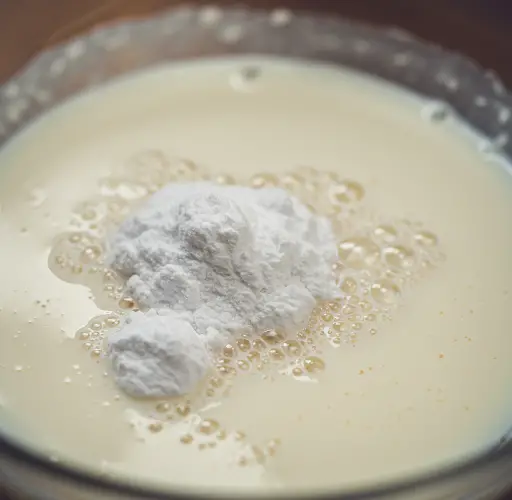Cucumbers are a refreshing and versatile crop that many gardeners love to grow. However, they can be prone to various diseases and pests that can affect their growth and productivity. While many gardeners turn to chemical fertilizers and pesticides to solve these problems, there are simple, natural methods that can significantly improve the health of your cucumber plants without relying on harmful chemicals. One such solution that has gained popularity among gardeners is the use of baking soda and milk. This combination not only helps protect cucumbers from diseases but also promotes their growth and enhances the quality of the produce.
The Benefits of Baking Soda for Cucumbers
Baking soda, also known as sodium bicarbonate, is a common household item with surprising benefits for plants. It has antifungal properties that help protect cucumbers from common fungal diseases like Downy Mildew, Powdery Mildew, and Blight, which often affect cucumber plants, especially in humid conditions. These diseases can cause the leaves to yellow, wither, and ultimately affect the overall health of the plant.
In addition to its antifungal properties, baking soda also helps balance the pH levels of the soil. Cucumbers prefer slightly acidic to neutral soil, and adding baking soda can help maintain the optimal pH for cucumber growth. This improves nutrient uptake, helping plants grow healthier and more robust.
How Milk Helps Your Cucumbers
Milk, another everyday item, is packed with proteins, vitamins, and minerals that can benefit your cucumber plants. The calcium in milk plays a vital role in strengthening the plant’s cell walls, improving overall structure, and reducing the risk of diseases like blossom end rot, which is common in tomatoes but can occasionally affect cucumbers as well. Additionally, milk provides essential nutrients that promote plant growth, making it a valuable addition to your garden care routine.
Milk also acts as a mild fungicide, helping to protect the plant’s leaves from fungal infections. The combination of proteins, vitamins, and minerals found in milk creates a nourishing environment that supports strong, disease-resistant cucumber plants.
The Magic Formula: Baking Soda and Milk Spray
Now that we understand the benefits of both baking soda and milk for cucumbers, let’s dive into how to prepare this natural solution and use it effectively in your garden. This simple spray will provide both protection against diseases and nourishment to your cucumber plants.
Ingredients Needed:
-
1 teaspoon of baking soda
-
1 liter of milk (whole milk works best)
-
1 liter of water
How to Prepare the Spray:
-
In a clean container, mix 1 teaspoon of baking soda with 1 liter of water. Stir until the baking soda is completely dissolved.
-
Add 1 liter of milk to the mixture and stir gently. The milk will provide essential nutrients and help create a protective layer on the leaves.
-
Pour the mixture into a spray bottle for easy application.
How to Use the Spray:
-
Spray the leaves and stems of your cucumber plants with this solution, making sure to cover both the tops and bottoms of the leaves. The goal is to provide an even coating that will protect the plant from diseases and provide nourishment.
-
Apply the spray once a week or after heavy rains, as the rain can wash away the solution.
-
Water the plants regularly to ensure they remain hydrated. Cucumbers require consistent moisture, especially during the growing season.
-
Ensure your plants get enough sunlight. Cucumbers thrive in full sun, so make sure they are positioned in a sunny spot in your garden.
Why This Method Works
The combination of baking soda and milk in this solution offers a natural, holistic approach to cucumber care. Baking soda helps to keep fungal diseases at bay, while the milk provides essential nutrients that encourage healthy growth. The calcium in the milk strengthens the plants’ structure, making them more resilient to disease and environmental stress. Additionally, this solution helps maintain the proper pH balance in the soil, which is crucial for nutrient uptake.
Regular use of this natural spray will lead to healthier, more productive cucumber plants. You’ll notice an improvement in the quality of your cucumbers, with larger, tastier fruits that are free from disease. Plus, by using natural ingredients like baking soda and milk, you’re reducing your reliance on harmful chemicals, making your gardening practices more eco-friendly.
Additional Tips for Growing Healthy Cucumbers
While the baking soda and milk spray is a fantastic tool for cucumber care, there are other important practices to keep in mind when growing cucumbers:
-
Choose the Right Variety: Some cucumber varieties are more resistant to disease and pests than others. If you’re starting from seed, consider selecting a variety that is known for its resilience.
-
Provide Proper Spacing: Cucumbers need plenty of space to grow. Overcrowding can lead to poor air circulation and increase the risk of fungal infections. Make sure to space your plants at least 12-18 inches apart.
-
Mulch Around the Plants: Mulching helps retain moisture in the soil and prevents weeds from competing with your cucumber plants for nutrients. It also helps maintain a stable soil temperature.
-
Prune Regularly: Keep an eye on your cucumber vines and prune away any dead or diseased leaves. This helps promote healthy growth and improves air circulation around the plant.
-
Water Consistently: Cucumbers need consistent moisture to thrive. Be sure to water deeply at the base of the plant, as watering the leaves can encourage fungal growth. Avoid letting the soil dry out completely between waterings.
Conclusion
Using baking soda and milk as a natural spray for your cucumbers is a simple, effective, and eco-friendly solution for promoting healthy plant growth and protecting against diseases. This easy-to-make mixture provides your cucumbers with the nutrients they need while preventing common fungal infections. Regular application will result in healthier, more productive cucumber plants, with fruits that are larger, tastier, and free from disease. Try this natural method in your garden and enjoy the benefits of chemical-free cucumber cultivation!



